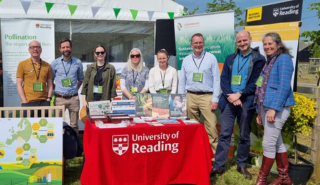University of Reading Partners with Waitrose for Nature-Friendly Farming Scheme
Scientists from the University of Reading are meeting British farmers and food businesses as Waitrose launches its Farming for Nature scheme to accelerate nature-friendly farming.
Waitrose is today (Wednesday 8 May) committing to support more than 2,000 of its British farmers to move to nature-friendly farming practices, helping to boost financial resilience of farms in the long-term and combat the effects of climate change.
This comes in response to an industry wide need to move to more resilient farming methods and demand from Waitrose customers: four in ten say they are worried about the impact that modern farming has on nature and wildlife.
Waitrose and the University of Reading will establish a three-year Knowledge Transfer Programme, backed by a grant from UK Research and Innovation (UKRI). This partnership will aim to bridge the gap between cutting-edge agricultural research and practical farming applications, giving farmers a direct resource to information to implement on their own farms.
Professor Carol Wagstaff, Research Dean for Agriculture, Food and Health at the University of Reading said:
“Reading has more than a century of expertise in agricultural innovation, and we know that to secure our food and nature in the century ahead, we need to make long-term plans.
“Farmers, researchers, retailers and shoppers all have a part to play. Farming for Nature provides the leadership to make Britain’s food system a force for good in fighting climate change and biodiversity loss, while remaining profitable.”
Key parts of the regenerative agriculture plan include:
– Waitrose unveils ‘Farming for Nature’ – working with its British farmers to move to nature-friendly farming
– Waitrose to source UK meat, milk, eggs, fruit and vegetables from farms that use regenerative practices by 2035
– Builds on commitment to reach net zero across Waitrose’s UK farms by 2035, and the entire supply chain by 2050.
Regenerative agriculture is a way of farming that focuses on improving the health of the soil and the environment, making it healthier and more productive. It helps tackle issues such as top-soil erosion – the loss of the most fertile layer of soil – which is being accelerated by some farming methods and can make it harder to grow crops. This, among other concerns, is why change is needed now to ensure food security in the future.
Unveiling the plans to its British farmers at the Waitrose farm in Hampshire, the Leckford Estate where Waitrose has been farming regeneratively since 2020, Executive Director James Bailey committed the supermarket to play its part revolutionising the British food system.
In his speech to farmers, James Bailey announced that Waitrose will work with them to produce food that works in harmony with nature, to source meat, milk, eggs, fruit and vegetables from UK farms which use regenerative practices by 2035.
it is hoped this will protect British farmers against the effects of climate change, enhance nature and ensure customers can buy the best and most delicious British-grown produce for many years to come.
James Bailey, Waitrose Executive Director, said:
“We want Waitrose customers to know that when they shop with us, they are voting with their purses and wallets for a food system that restores and works in harmony with the natural world, and that supports a financially sustainable future for British farmers.
“We have a duty to help our farmers make the move towards more nature-friendly growing, and we’re committed to playing our part in the revolution that our country’s food system requires.”
Key parts of the plan include collaborations with LEAF and the University of Reading. Farming for Nature builds on the Partnership’s Plan for Nature and commitment for Waitrose’s UK farms to be Net Zero by 2035, and the Partnership’s clear dedication to play its part in limiting the global temperature rise to 1.5°C.

